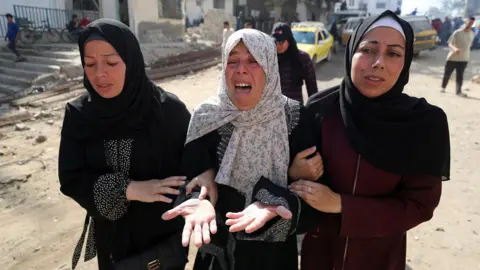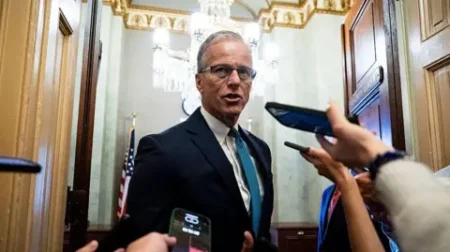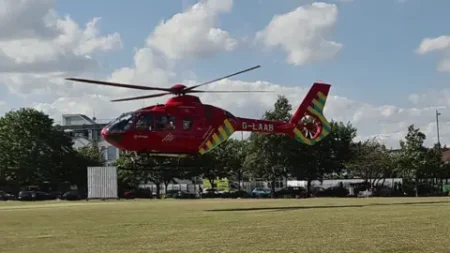In the ongoing violence in Gaza, the latest reports indicate a heavy toll on civilian lives, with at least 81 Palestinians killed and over 400 injured following Israeli airstrikes just within a 24-hour period up to midday Saturday. The statistics come from the ministry of health run by Hamas, which governs the Palestinian territory. This tragic loss of life underscores the severe humanitarian crisis that has continued to grip the region amidst escalating tensions and hostilities.
The strikes have also targeted locations where civilians have sought refuge. Notably, an attack near a stadium in Gaza City led to the tragic deaths of at least 11 individuals, including children. Reports from hospital staff and eyewitnesses detail how the stadium was being utilized as a makeshift shelter, housing displaced families who had lost their homes. The violence is further exacerbated by the harrowing imagery of rescue efforts where civilians and emergency services worked tirelessly to unearth victims buried under rubble.
Video evidence verified by the BBC documents these desperate attempts to recover bodies, showcasing civilians using their bare hands and rudimentary tools like spades. These visuals serve as a visceral reminder of the depths of despair faced by those in the region. Meanwhile, inquiries regarding the military actions have been directed at the Israeli military, which has not yet provided a detailed response to the escalating situation.
In the broader context, U.S. President Donald Trump expressed cautious optimism regarding potential ceasefire negotiations within the week, noting that Qatari mediators were attempting to leverage U.S. influence to foster dialogue. However, historical precedents highlight the complexity of such discussions. A fragile ceasefire that was established in January crumbled in March, following Israeli airstrikes that ignited further conflict after a brief cessation of hostilities.
The collapse of previous ceasefire efforts was rooted in unfulfilled promises like the return of hostages held in Gaza in exchange for Palestinians imprisoned in Israel. The complexity of negotiations continues to hinder progress; according to a senior Hamas official, talks have gained momentum but are currently stalled with Israel.
On the ground in Israel, the escalating conflict has sparked public demonstrations. A rally held in Tel Aviv drew attention to the plight of Israeli hostages still held by Hamas, with participants calling for action to end the fighting and return home. This interwoven narrative of captured civilians on both sides raises challenging moral and political questions that surround the conflict.
Despite the ongoing humanitarian crises, reports persist regarding Israeli military actions in Gaza. An instance occurred where strikes near the Palestine Stadium resulted in the deaths of innocents who were simply seeking shelter. Eyewitness accounts convey a sense of sorrow and confusion, as civilians question the justification for the violence directed toward their communities. Ahmed Qishawi, a local resident, expressed disbelief at the targeting of noncombatants, stating unequivocally that there were no militants present in these civilian areas.
Recent strikes in al-Mawasi have further added to the casualty toll, where families succumbed to airstrikes while asleep—aggravating the sorrow echoed by bereaved relatives who question the rationale behind such acts of violence. One grieving grandmother lamented, “What did these children do to them? What is their fault?” highlighting the senselessness perceived in these tragic losses.
The Israel Defense Forces (IDF) has offered some commentary on these events, claiming that they successfully targeted a senior Hamas military figure linked to previous attacks in Israel. Their bombing campaign has gained momentum following the brutal assault that occurred on October 7, resulting in significant casualties and a host of international ramifications. Reports suggest a staggering count of over 56,000 individuals lost in Gaza in recent months due to the sustained conflict.
As this situation continues to unfold, the international community watches with bated breath, as the prospects for peace seem increasingly elusive amid the persistent cycle of violence and retaliation.











